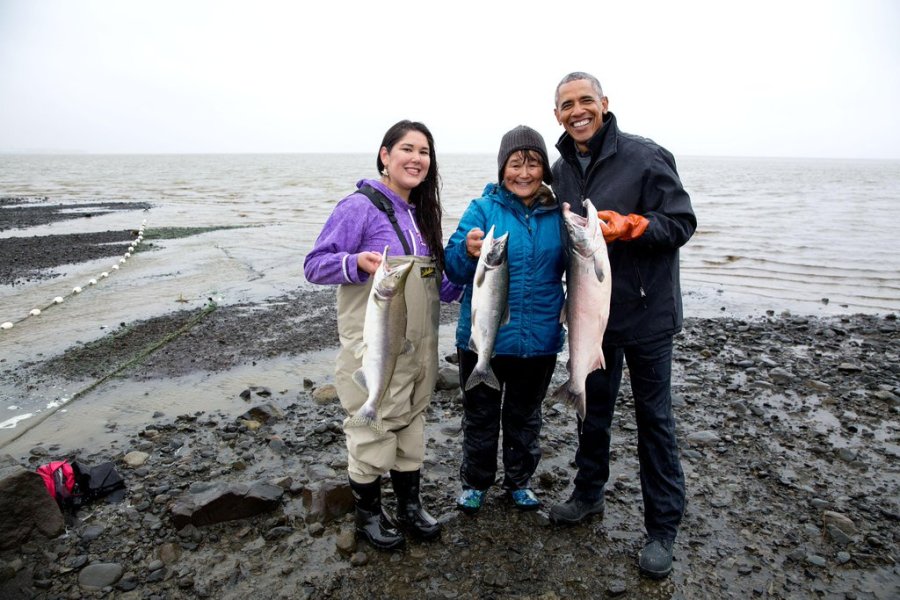
Two years ago in Iqaluit, Canada’s “heart of the Arctic,” the U.S. took over the chairmanship of the Arctic Council, the region’s leading intergovernmental organization. The U.S. sent Secretary of State John Kerry to the event, continuing the recent tradition of the country sending its highest ranking diplomat.
Tomorrow at the Arctic Council Ministerial meeting in Fairbanks, U.S. Secretary of State Rex Tillerson will continue that tradition. Other than that, however, there’s a world of difference under the hood of the U.S. Arctic Council chairmanship.
The U.S. agenda for its chairmanship, which rotates every two years between the eight Arctic Council member states, was “One Arctic: Shared Opportunities, Challenges and Responsibilities.” The three themes within this vision involved improving economic and living conditions in Arctic communities, Arctic Ocean safety, security and stewardship, and addressing the impacts of climate change. If we measure the U.S. by its own yardstick – in other words, the goals in set out to accomplish two years ago – it’s probably done the most in the second and third areas. The U.S. presided over the establishment of the U.S. Arctic Coast Guard Forum in October 2015, which has helped to maintain dialogue between Russia and the West in the Arctic. This is probably one area in which the previous and current administrations in the White House agree on its importance. At a time when tensions remain high between Russia and the West, the U.S. chairmanship has continued to emphasize a unified Arctic. Its theme of “One Arctic” has fostered strong levels of cooperation at sea and on land in the North and continued the project of region-building in the Arctic, helping member states to see shared priorities and concerns.
But it’s in the area of climate change where the U.S. chairmanship has been arguably the most successful in galvanizing action — and where the current administration has been trying to reverse a lot of the progress made. That’s why in Fairbanks tomorrow, it will be interesting to watch what remarks Tillerson delivers. Will he downplay the accomplishments of the U.S. in this area, which were all made by his boss’ predecessor, President Barack Obama, in order to focus on Trump’s goals of economic development, America First and climate last?
If he does that, this will be a disservice to the many accomplishments made by the U.S. Arctic Council chairmanship with regard to climate change. Just a few months after the U.S. took over from Canada, in September 2015, Obama became the first sitting president to visit Alaska. He traveled to the North Slope town of Kotzebue and flew over the village of Kivalina, whose shoreline is eroding away. When Obama tweeted, he directly linked his love for Alaska to his passion for the “fight on climate change” – a fight that Trump clearly does not want to keep up. (Ominously, the video that was included is “no longer available”.) He even wrote a blog post on Medium describing how touched he was by his visit.
I loved Alaska and met so many inspiring people. Have to keep up the fight on climate change for their sake—and ours. http://t.co/HzWW0S6iQc
— President Obama (@POTUS44) September 3, 2015
The U.S. Arctic Council chairmanship also focused on promoting Arctic science. It targeted reducing short-lived climate pollutants like black carbon, which exacerbates Arctic climate change by covering up snow that would otherwise reflect away sunlight, supported Arctic climate adaptation and resilience efforts, and launched an initiative to create a two-meter digital elevation model (DEM) of the Arctic, which should be finished by this summer. The White House also hosted the first-ever Arctic Science Ministerial in September 2016, inviting researchers from around the world to discuss their work. Capping off all these scientific efforts, the U.S. and Russia co-chaired efforts to draft what will become the third-ever binding agreement under the Arctic Council once it is signed in Fairbanks tomorrow: the Agreement on Enhancing International Arctic Scientific Cooperation.
It is difficult to imagine Tillerson, who has stated in writing that he does not believe that fossil fuels are a “key” factor behind climate change, to laud the accomplishments of the U.S. in this area. Instead, he may choose to focus on the chairmanships’ work in promoting economic development, which have not nearly been as monumental. Canada, the previous Arctic Council chair, focused much more on this issue, as underscored by its establishment of the Arctic Economic Council. Already, the Trump administration has tried to make some nominal headway in this area. On April 28, he signed an executive order attempting to reverse the Obama administration’s moratorium on offshore drilling in the Beaufort and Chukchi Seas, which some Alaskans cheered. However, in so doing, Trump also controversially eliminated a tribal advisory council established under the Obama administration to provide recommendations and guidance on maritime activities in the Bering Sea.
So even if Tillerson attempts to shift a little bit of the U.S. chairmanship’s focus away from climate change and towards industry and development, this has to be taken with a big grain of salt. As I wrote previously, among other cuts, Trump’s proposed budget threatens to eliminate the Essential Air Service, the Economic Development Administration, and the Denali Commission, all of which provide vital services to rural and Native Alaskans. While the current administration is pro-development in Alaska, it’s hardly the type of sustainable, local development that is needed across the Arctic today.
As Finland takes over, it will renew the Arctic Council’s focus on climate change, returning to the organization’s early roots of being focused on environmental issues when it was established 20 years ago. The first sentence on the Finnish chairmanship’s website states how the country “emphasizes the implementation of the Paris Agreement on climate change,” which Trump has threatened to pull the U.S. out of.
Outgoing Chair of the U.S. Senior Arctic Official David Balton said yesterday via teleconference, “The U.S. will remain engaged in the work that the Arctic Council does on climate change throughout.” The question, however, is really what level that engagement will be. With the White House deleting scientific data on climate change and trying to stimulate the very industries that will exacerbate black carbon emissions and Arctic warming like oil and coal, Finland and all other Arctic Council stakeholders would be wise to be wary.


Mia, excellent statement of the crossroads faced. I am not optimistic. At best, he will equivocate, but if that was the intent, it would have been best to stay home. Again, as in so much else in this time, we will reverse course, adopt retro-thinking, dilute progress to date, isolate ourselves in the well-intended community, alienate everyone, and lose every advantage from sustainable development to community survival to the high moral ground. I trust you will report after the fact. Best wishes, Peter.
>